Addictive South African Rusks Without Dairy – Portable Snack
These delicious South African rusks are great for quick meal prep breakfasts with a cup of coffee or tea. You can store them in the pantry for several weeks– and they’re also a great easy snack idea or breakfast on the go! If you’re looking for more yummy and wholesome morning meals, try our lemon almond flour muffins, almond flour sheet pan pancakes, whole wheat sheet pan pancakes, granola with chocolate chips or yogurt with chia seeds. And if you prefer a quick smoothie for breakfast, you can’t go wrong with any of these delicious smoothies…
Essential South African Rusks…
Nary a South African can say they haven’t sat quietly with a cup of rooibos tea and a few rusks. At the heart of any South African cookbook is a recipe for South African rusks, and any South African would probably agree that rusks are a part of the culture—a culture that still stops for tea every day around four o’clock.
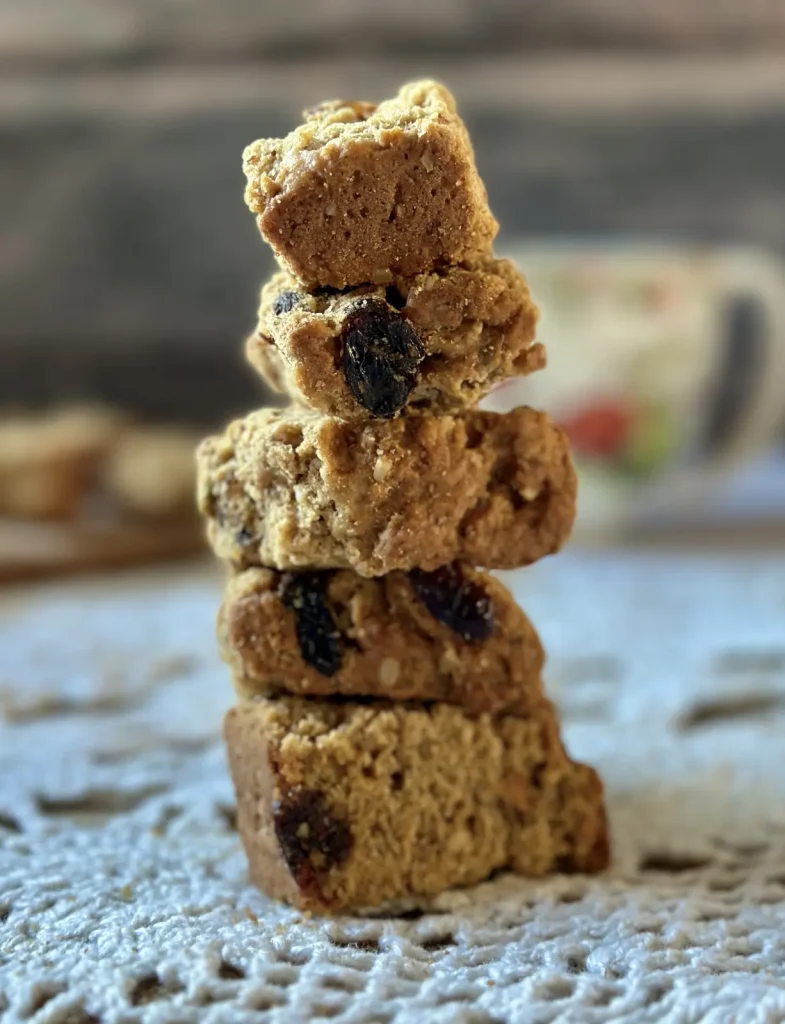
One could suppose that rusks may be eaten alone, but it’s really not like that. Rusks come with tea and tea comes with rusks. Or coffee. Without a hot drink to dip into, rusks are crunchy and maybe too hard for the average chewer. But with tea or coffee, rusks are soft and crumbly and delicious soaked in the drink’s flavor.
I’ll admit, I sometimes snack on them without tea, but it’s really not the same. Still, I have strong teeth and these rusks are such a quick, healthy snack that I can’t resist. Some milk on the side doesn’t hurt though.
What Are Rusks?
South African rusks are cakey bread that’s baked, cut and dried until crunchy. Like biscotti, they are usually served with tea to soften them. Rusks are traditionally made of flour, buttermilk, eggs and sugar, and often with nuts and raisins. However, they are easily made vegan or whole grain.
Originating from South Africa, rusks are a staple of the country, particularly to the Afrikaner community. The Boer Voortrekkers—who “trekked” from the British Cape to the wild and unknown transvaal by wagon—invented rusks as a way to preserve their bread (and their lives).
Rusk Ingredients
- Flour: Every rusk recipe is a little different, but all require some kind of flour as a base. This South African rusk recipe is on the healthier side, using just about half wheat and half white flour, plus a few cups of all bran flakes.
- Sugar: You can play around with the sugar content. A traditional South African rusk recipe might call for two full cups of sugar, but that amount is truly not necessary. Halving it to one cup produces rusks that are just perfectly right—not too plain, not too sweet. I prefer to use coconut sugar as its a bit less refined.
- Dried Fruit and Nuts: It’s not required to use dried fruit or nuts, but both are delicious choices that only improve the recipe. Chopped dates, cranberries or raisins make these treats higher in fiber, while nuts like pecans add filling protein.
- Bran Flakes Cereal: Here you can use any kind of bran flakes cereal you can find. Even raisin bran would be okay if you adjust the sugar content of the rusk recipe. All Bran Flakes sometimes come in different shapes (like sticks) – that’s fine, too.
- Ground Flaxseed: The flaxseed acts as an egg replacement, so if you eat eggs then you are welcome to use 2 eggs instead.
- Cashew Yogurt: If you eat dairy, you are welcome to sub with plain Greek yogurt.

How To Make South African Rusks
Making Flax Eggs
This particular South African rusk recipe is vegan, but using eggs is an option if you don’t have flaxseeds.
If you are sticking with these vegan rusks, start by making your flax eggs. All you do is mix in a small bowl 2 tablespoons of ground flaxseeds (1 per “egg”) with anywhere from 6-9 tablespoons of water.
You’ll have to be a scientist here and decide when the “eggs” are runny enough, but don’t stress it too much. You have three spoons of wiggle room and it doesn’t matter if it’s not perfect, no one will ever know! Let the flax eggs sit for about 10 minutes while you prep the other ingredients.
Make Cake and Bake
Use two big bowls: one for wet ingredients, one for dry.
In one bowl, mix your flours, salt and baking powder together (1 teaspoon baking powder per cup of flour, which is 8 teaspoons or roughly 2.5 tablespoons). Then, mix in your bran flakes, nuts and raisins. Do not add sugar yet!
In a large glass bowl, melt coconut oil. You can microwave it, or heat separately in a small saucepan then pour it into a bowl.
While the oil is warm, mix in the sugar to dissolve it a bit. When the oil and sugar is mixed well, whisk in flax eggs. Finish by adding yogurt and vanilla.
Make sure the wet ingredients are mixed together very well, then add them to your dry ingredients. Mix until just combined (don’t over-mix at this point).
Pour batter into a casserole dish lined with parchment paper. Bake at 350 degrees for 1 hour until a toothpick comes out clean.
Cool the rusk bread/cake for 10 minutes in the dish, then transfer to a wire cooling rack until completely cool (about 20 minutes). If you cut them while they’re still hot, they will fall apart.
The next step is to cut rusk-sized pieces—basically rectangle cubes you can comfortably hold and dip into tea. Go with your preference here. Some people prefer big, hearty rusks, and some prefer small ones.
For scale, I’ve seen some almost as narrow as scotch tape and some as wide as packaging tape (don’t ask, just looking at my desk haha!).
Drying Your Rusks: The Re-bake
Drying times will vary depending on your method. A traditional South African rusk recipe usually calls for up to 6 hours drying in an oven at 180 degrees, but things have changed. With the invention of the air fryer, you can toss in your rusks 250 degrees for only 20 minutes. Quite a difference.
Every oven and every air fryer is a little bit different, so you’ll have to do some estimating yourself. You’ll have to check that your rusks aren’t burning every so often. If you’re drying them in the oven, maybe set an alarm for every hour to check on them.
Enjoy rusks with some rooibos or breakfast tea or coffee. My daily requirement is English breakfast tea with honey and almond milk, and a rusk on the side is always welcome.

Love South African Classics?
There are a few childhood favorites that I simply can’t live without, like this simple chicken potato stew. In SA, it would be called a chicken tomatie bredie. In any language it’s a winner winner chicken dinner.
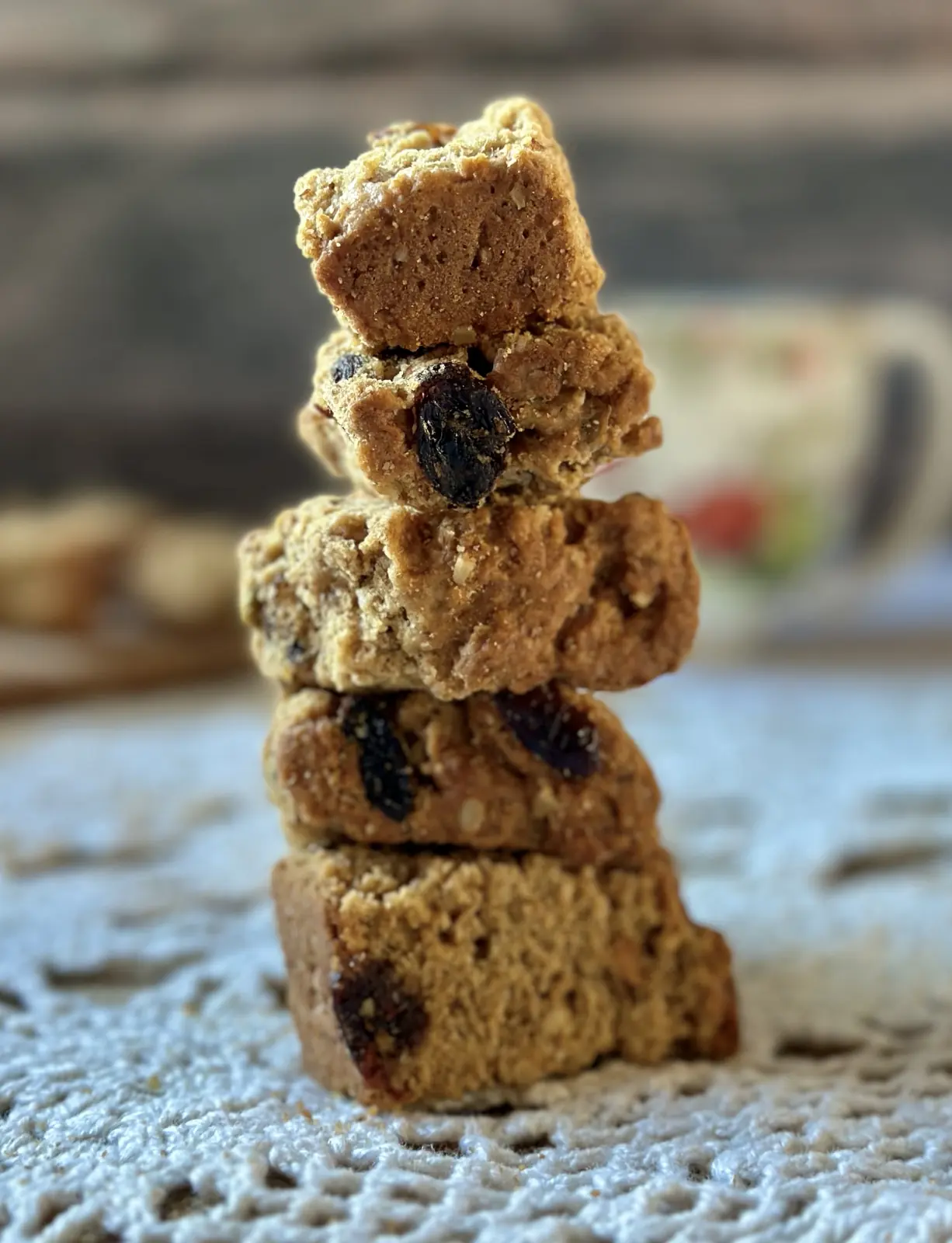
South African Rusks
Ingredients
- 4 cup whole wheat flour
- 4 cup white flour
- .5 tsp salt
- 2.5 tbsp baking powder roughly 1 tsp per cup flour
- 3 cup bran flakes cereal
- 1 cup raisins
- 1 cup pecans
- 1 3/4 cup coconut oil
- 1 cup sugar
- 2 tbsp ground flaxseed to make 2 flaxseed eggs (or if not vegan, use 2 eggs)
- 3 cup cashew yogurt (if not vegan, use Greek yogurt)
- 1 tsp vanilla
Instructions
- Start by making your flax eggs. You’ll need either two eggs or two flax eggs, which are super quick and easy to make. Mix in a small bowl 2 tablespoons of ground flaxseeds (1 per “egg”) with anywhere from 6-9 tablespoons of water. After 6 tbs, add one spoon at a time until you have a somewhat firm yet runny consistency. Let the flax eggs sit for about 10 minutes while you prep the other ingredients.
- Preheat oven to 350 degrees.In a large bowl, mix flours, salt and baking powder together (1 teaspoon baking powder per cup of flour, which is 8 teaspoons or roughly 2.5 tablespoons). Then, mix in your bran flakes, nuts and raisins.
- In a large glass bowl, melt coconut oil. You can microwave it, or heat separately in a small saucepan then pour it into a bowl. While the oil is warm, mix in the sugar to dissolve it a bit. When the oil and sugar is mixed well, whisk in flax eggs. Finish by adding yogurt and vanilla.
- Make sure the wet ingredients are mixed together very well, then add them to dry ingredients. Mix until just combined (don’t over-mix at this point).
- Pour batter into a casserole dish lined with parchment paper. Bake for 1 hour until a toothpick comes out clean.
- Cool the rusk bread/cake for 10 minutes in the dish, then transfer to a wire cooling rack until completely cool (about 20 minutes). If you cut them while they’re still hot, they will fall apart.
- Cut rusk size pieces—basically rectangle cubes you can comfortably hold and dip into tea (about 1-2" x 1-2" x 3-4"). Go with your preference here.
- Now the rusks need to dry. Drying times will vary depending on your method. If you’re using an oven, try about 6 hours at 180 degrees. If you’re using an air fryer, try 250 degrees for only 20 minutes. Every oven is a little bit different, so you’ll have to do some estimating yourself and check that your rusks aren’t burning every so often. If you’re drying them in the oven, maybe set an alarm for every hour to check on them.
- Once dry, store at room temperature in an airtight container for up to a few months.

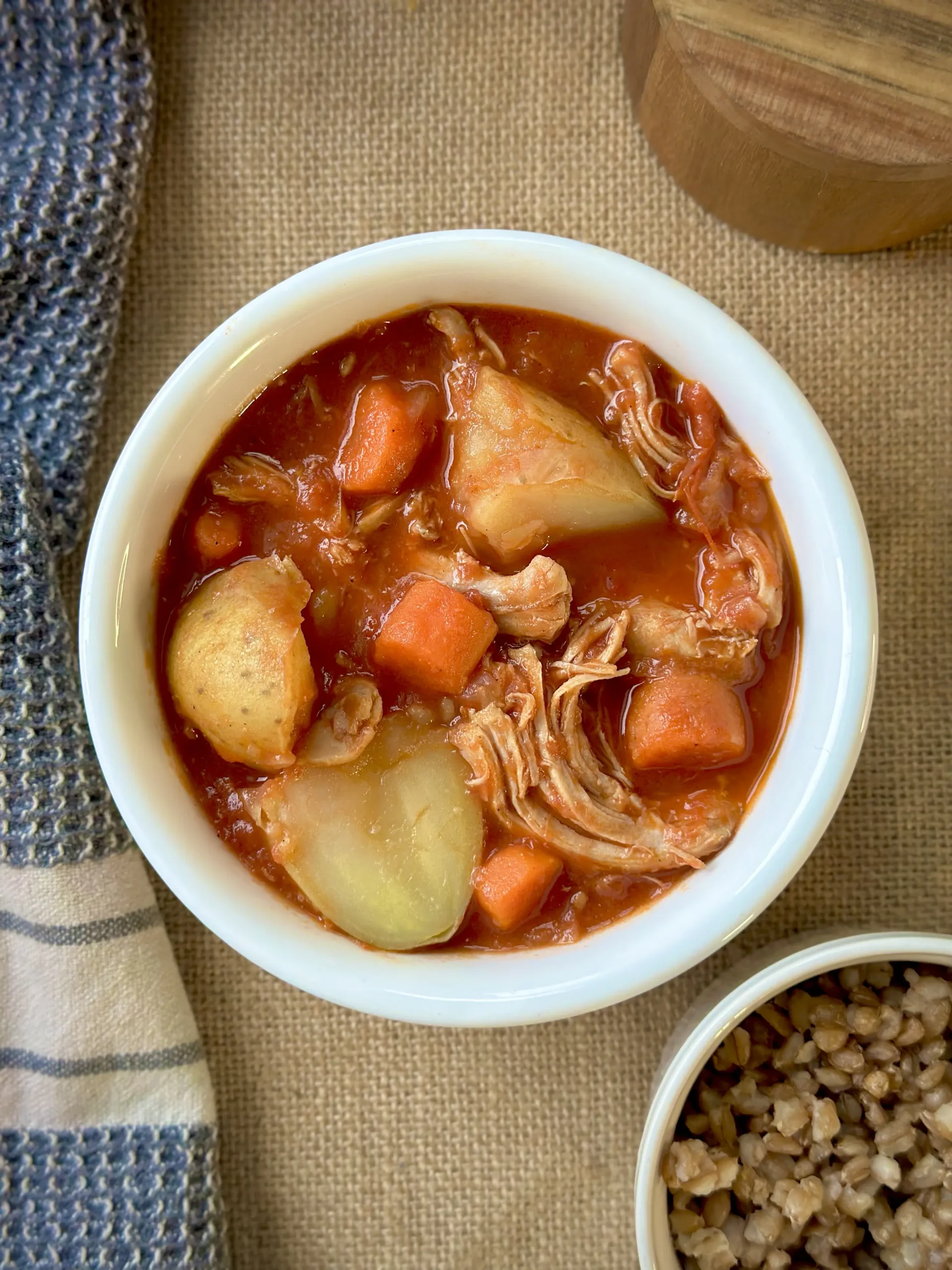
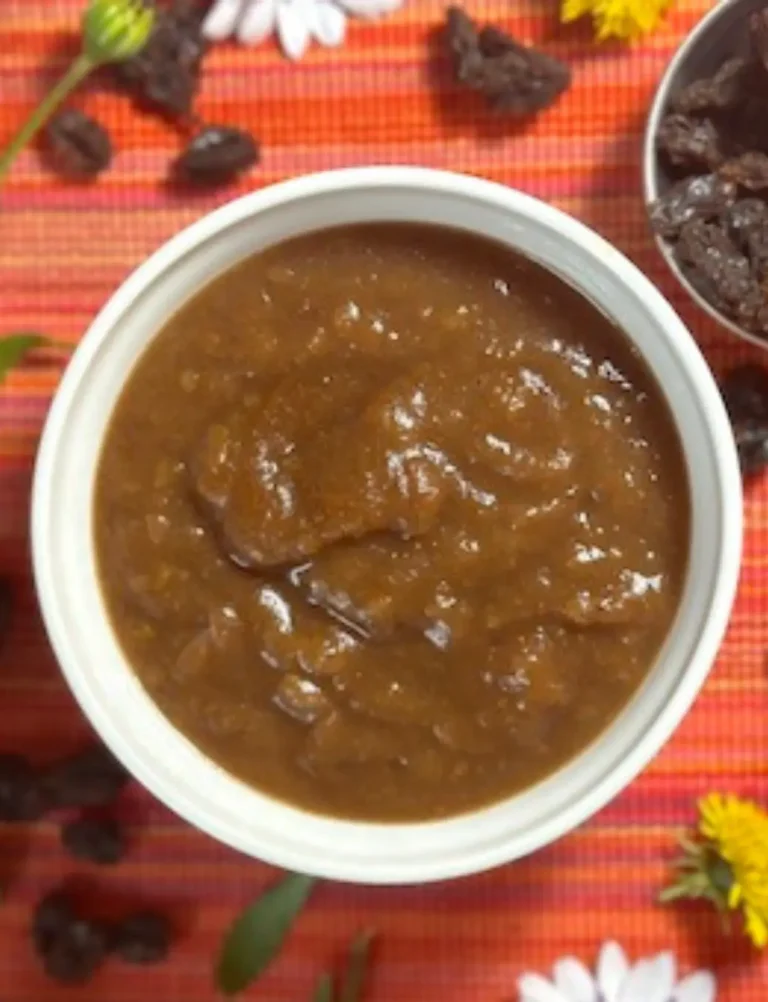
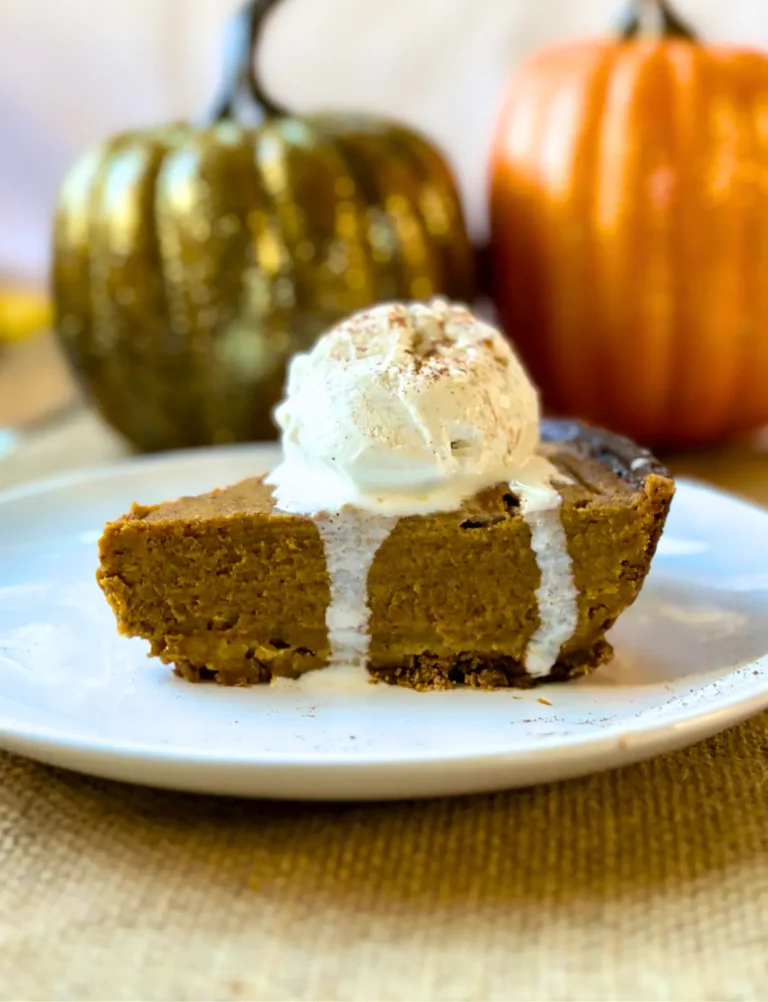


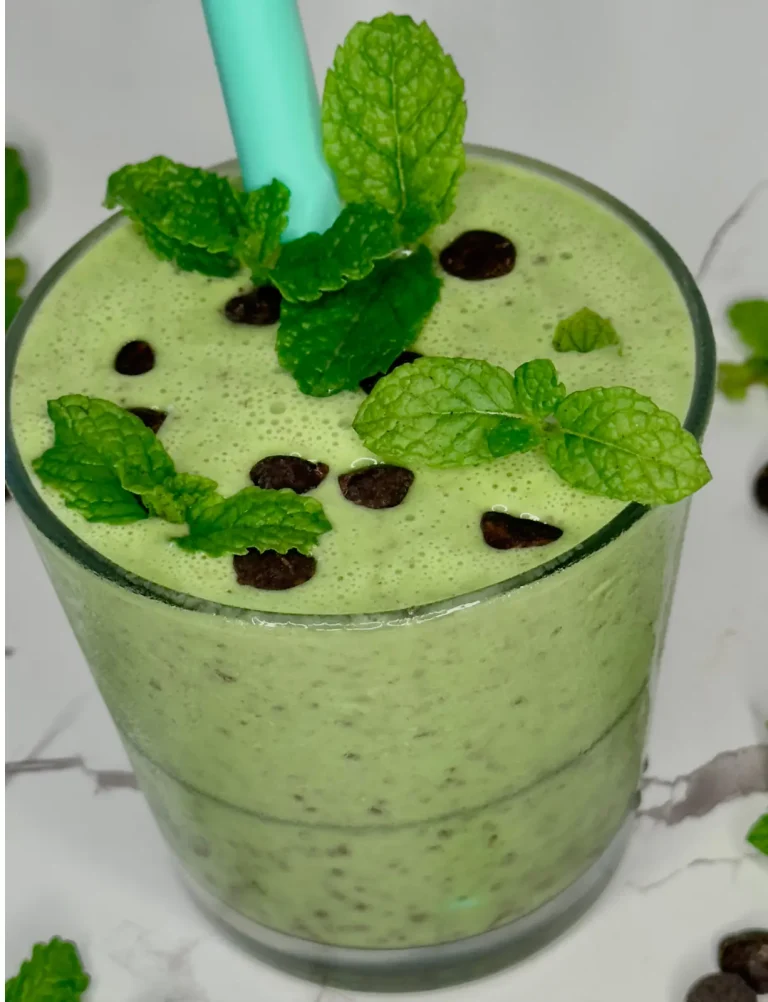
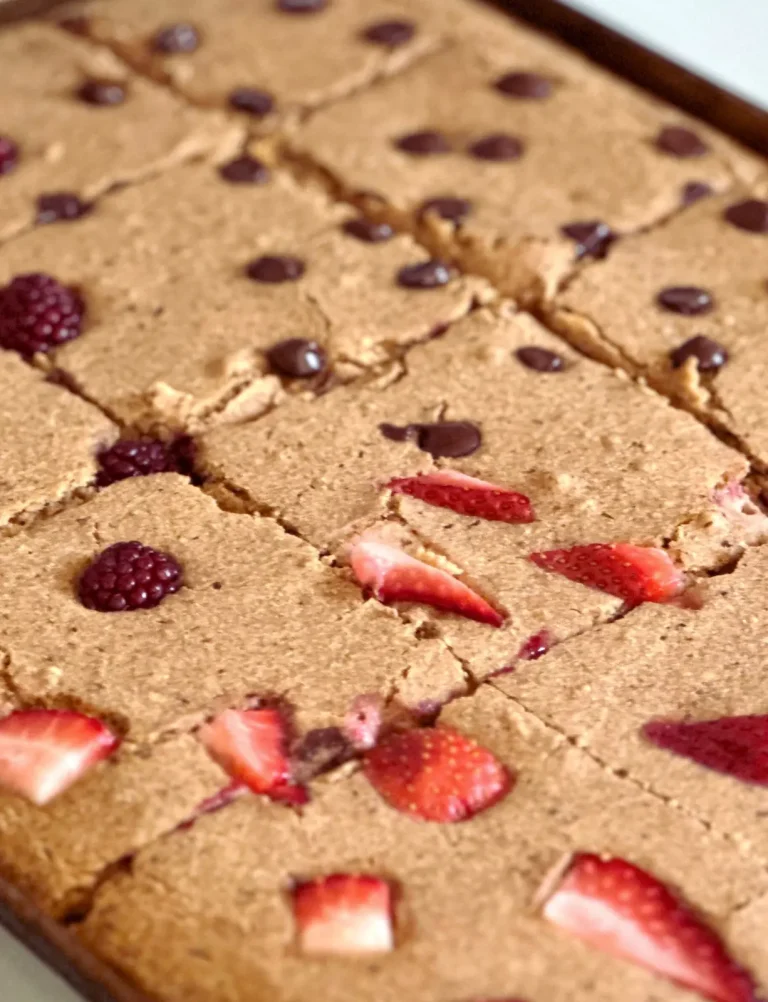
These are addicting, perfect breakfast snack!
Thanks Matthew, I totally agree, can’t stop eating them!
I am a rusk lover and up until a month ago (due to dietary restrictions now) I always had a piece of rusk with my morning coffee.
Once back on track, I am looking forward to my rusks as they are sitting in the cupboard looking at me daily.
Oh, I love rusks, too! Good thing they will last in your cupboard!!
These sound delicious! I love that you described them as biscotti like. Because then it gives the exact expectation to have about texture and makes perfect sense to have them with tea. I love dried fruit and nuts in anything!
Thank you! Biscotti is definitely the closest comparable food. Rusks can seem intimidating bc they take a while to dry and get the hang of but they are so worth it because they last so long and they’re such an easy filling snack!